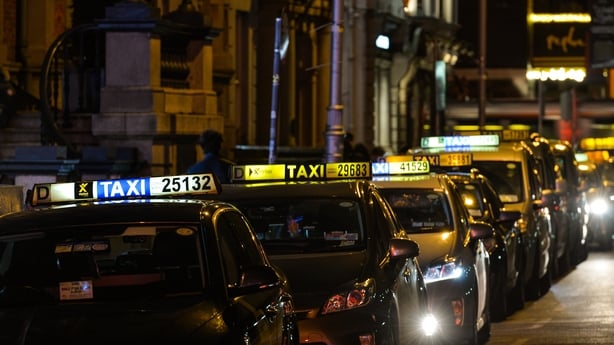One of the country’s largest taxi apps, Free Now, is calling for staggered hospitality opening hours to help ease demand for taxis during peak times.
The operators of the app have been giving evidence before the Oireachtas Transport Committee today as part of a discussion on the shortage of taxi drivers.
Fiona Brady, Head of Operations with Free Now, told the committee that “modernising licensing laws will assist in easing high demand in city centres when pubs close”.
She added: “The Irish taxi market now finds itself at a pivotal juncture as society and the economy emerge from the pandemic.
“As it stands, taxi services are struggling to meet demand at certain times in cities across Ireland.”
Niall Carson, General Manager of Free Now, said they can see a number of pinch points during the day through their app.
He said midnight to 2am is one but there are also times during the day when demand is extremely strong, these include 8am to 9am and 4:30pm to 6:30pm when people are using taxis as an alternative to public transport.
He said they have seen a number of extreme surges in demand during high profile events.
“During Garth Brooks [concerts] we would have seen a level of 10,000 requests coming from the public in just the one area.
“For Ireland versus Wales there were 51,000 requests over a two-and-a-half-hour period.
“During the Marlay Park concerts there were 50,000 over a three-hour period. For Westlife there were 35,000 over a two-hour period.”
Mr Carson also called for a number of changes to encourage new entrants into the industry.
These include a reduced focus on geography knowledge in the driver entry test to take account of “the ubiquitous nature of technology”.
He also urged the introduction of integrated ticketing to allow customers move between the bus, train, tram and taxis in a joined up and easy-to-use way.
Anne Graham, CEO of the National Transport Authority, told the committee there are around 11% fewer taxis on the road after the pandemic.
However, she said there are signs of recovery and the NTA has introduced a number of measures to encourage more drivers to enter the market.
One of these is a new fare structure came into effect on 1 September.
“Drivers indicated that if we have a higher fare associated with peak times/night times they would be more willing to work,” she noted.
“That fare has just been introduced and we will have to see what the impact of that is.
“But the other route is to provide more public transport, we are now moving to 24-hour bus services in Dublin. We have eight routes operating and we want to roll those out in conjunction with Bus Connects.”
Ms Graham also said she is not in favour of transport police on public transport.
“If you have a dedicated transport police, how would you place your police? You are never going to cover every service that is provided across the state.
“We have a national police force. If we have good working relationships – as we do – our operators can call upon An Garda Síochána in any part of of the country.
“I think that’s preferable to having a dedicated transport police on particular services.”
Ms Graham added that “operators do provide private security at different points and they do spend significant parts of their budget in areas where there is known antisocial behaviour”.
She said that everyone has seen some of the abhorrent events on social media in relation to anti-social behavior on public transport.
But these but these “have to be put into the context of the number of successful journeys that take place without incident”.
© RTÉ 2022. RTÉ.ie is the website of Raidió Teilifís Éireann, Ireland’s National Public Service Media. RTÉ is not responsible for the content of external internet sites.
Images Courtesy of Getty Images.

